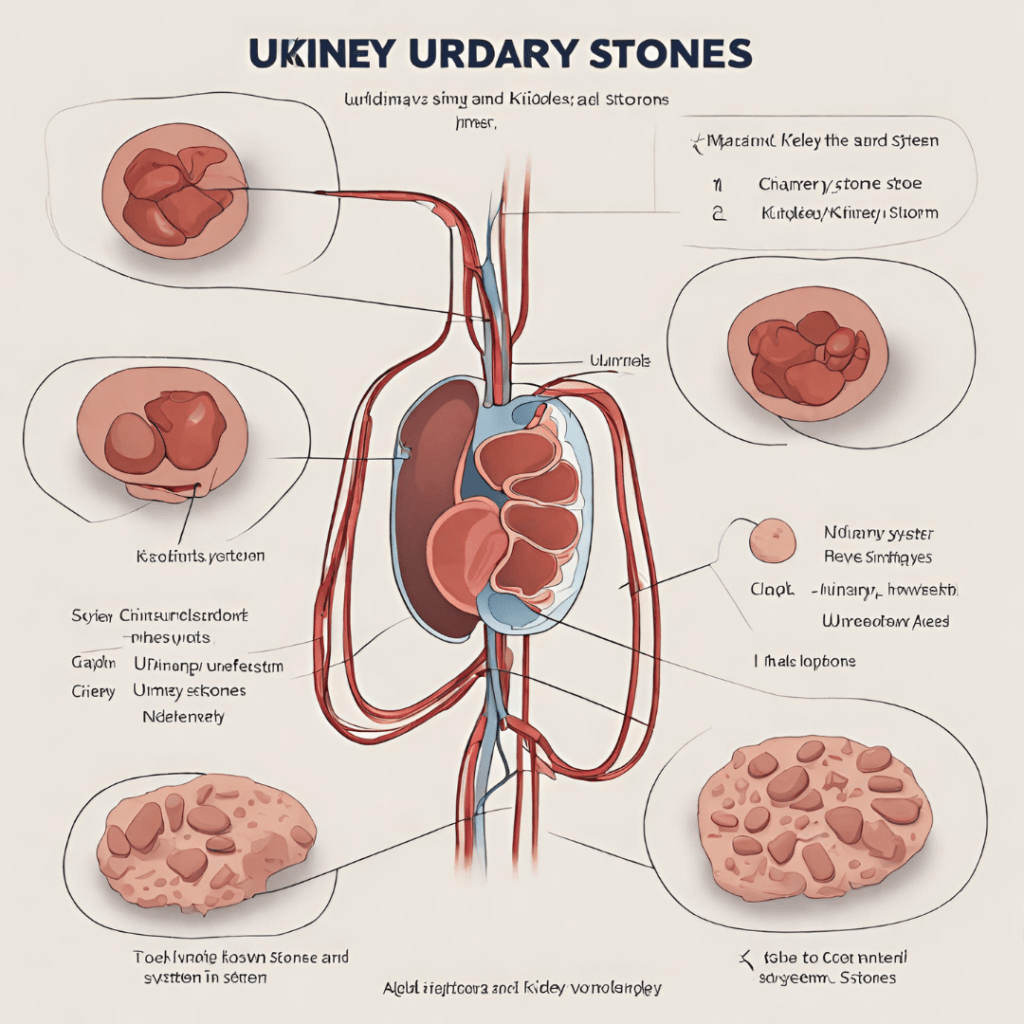Great Health Great Fitness
“Kidney Stones: Triumph Over Causes, Symptoms, Treatment, and Prevention”
Kidney stones can be a painful and disruptive condition, but they're not insurmountable. By understanding their causes, recognizing symptoms early, seeking appropriate treatment, and adopting preventive measures, we can triumph over kidney stones. It's about taking control of our health and finding relief from this common ailment.

Introduction:
Kidney stones, formidable in their small size yet mighty in their impact, can wreak havoc on one’s well-being. In this exhaustive exploration, we plunge into the intricate world of kidney stones, leaving no stone unturned as we uncover their causes, symptoms, treatment modalities, and preventive strategies. Through this comprehensive guide, our mission is to empower individuals to conquer kidney stones, reclaiming control over their health and vitality.
Our journey into the realm of kidney stones is a comprehensive endeavor, leaving no aspect untouched as we navigate through the complexities of this condition. By unraveling the mysteries surrounding their genesis, manifestation, and management, we equip individuals with a robust understanding that serves as a compass in their quest for relief and restoration.
As we delve deeper into the intricate world of kidney stones, we illuminate the myriad factors that contribute to their formation. From dietary habits and hydration levels to underlying medical conditions and genetic predispositions, the tapestry of influences shaping the development of kidney stones is vast and multifaceted. By dissecting these elements with precision and clarity, we empower individuals to identify and address the root causes of their condition, laying the foundation for effective treatment and long-term prevention.
Our exploration extends beyond mere comprehension to encompass the tangible manifestations of kidney stones—the symptoms that herald their presence and the toll they exact on one’s physical and emotional well-being. We delve into the excruciating pain that accompanies kidney stone attacks, the urinary disturbances that signal their presence, and the profound impact they can have on daily life. Through this intimate understanding, individuals gain insight into the nuances of their condition, enabling them to recognize and respond to its challenges with resilience and resolve.
Understanding Kidney Stones:

Definition and Prevalence:
Kidney stones, solid masses formed from crystals of various minerals and salts, can vary in size and composition, ranging from minuscule particles to sizable obstructions within the urinary tract. Despite their diminutive stature, kidney stones are a prevalent urological affliction, impacting millions of individuals globally each year. While their occurrence spans diverse demographics, certain predisposing factors, such as age, gender, dietary habits, and medical history, can elevate one’s susceptibility to their formation.
Types of Kidney Stones:
The taxonomy of kidney stones encompasses a spectrum of compositions, each dictating distinct characteristics and necessitating tailored treatment approaches. Among the most encountered variants are calcium stones, arising from an excess of calcium oxalate or calcium phosphate; uric acid stones, stemming from elevated uric acid levels; struvite stones, typically associated with urinary tract infections; and cystine stones, a consequence of genetic disorders impairing cystine metabolism.
Causes of Kidney Stones:
Dietary Factors:
The dietary landscape plays a pivotal role in the genesis of kidney stones, with certain dietary constituents predisposing individuals to their formation. Foods abundant in oxalates, such as spinach, nuts, and chocolate, can foster the development of calcium oxalate stones. Similarly, diets rich in sodium and animal proteins may exacerbate the risk of uric acid stone formation, highlighting the intricate interplay between dietary choices and renal health.
Dehydration:

Dehydration serves as a potent catalyst for kidney stone formation, precipitated by the concentration of urine when adequate fluid intake is compromised. As urine becomes more concentrated, minerals and salts are more prone to crystallization, laying the groundwork for stone development. Thus, vigilant hydration practices are paramount in mitigating this risk, underscoring the importance of maintaining optimal fluid balance.
Medical Conditions:
A constellation of medical conditions can serve as harbingers of kidney stone formation, underscoring the multifactorial nature of this malady. From urinary tract infections and gout to inflammatory bowel disease and metabolic disorders like hyperparathyroidism and cystinuria, a myriad of pathological states can predispose individuals to renal calculus formation, necessitating comprehensive management strategies tailored to the underlying etiology.
Symptoms of Kidney Stones:
Pain:
The hallmark symptom of kidney stones, pain manifests as an agonizing sensation that often ensues suddenly and relentlessly. Characterized by its colicky nature, the pain radiates from the flank or lumbar region to the lower abdomen and groin, paralleling the trajectory of the urinary tract. The severity of the pain is contingent upon factors such as stone size, location, and obstructive potential, leaving individuals incapacitated and in dire need of relief.
Urinary Symptoms:
A litany of urinary symptoms accompanies the presence of kidney stones, reflecting the disruption they inflict upon the urinary milieu. Increased frequency of urination, urgency, and dysuria serve as harbingers of urinary tract perturbation, while hematuria—a hallmark of stone-induced injury—bears testament to the abrasive nature of these obtrusive formations on the delicate urothelial lining.
Nausea and Vomiting:
The visceral anguish inflicted by kidney stones often elicits a visceral response, with nausea and vomiting serving as common companions to the excruciating pain. Whether triggered by the intense discomfort or the body’s reflexive response to ureteral obstruction, these gastrointestinal symptoms compound the misery endured by afflicted individuals, warranting prompt intervention to alleviate their distress.
Treatment Options for Kidney Stones:

Conservative Management:
For diminutive stones with a favorable prognosis, conservative management strategies may suffice in effecting resolution. Pain management with analgesics, hydration therapy to promote stone passage, and dietary modifications to curtail stone recurrence constitute the cornerstone of this approach, underpinning the importance of vigilant monitoring and adherence to therapeutic regimens.
Moreover, hydration therapy assumes paramount importance in promoting the natural passage of stones through the urinary tract. By encouraging ample fluid intake, typically in the form of water, the urine becomes more dilute, facilitating the dissolution of mineral deposits and easing the transit of stones. This simple yet effective intervention not only expedites stone passage but also helps prevent dehydration—a common risk factor for stone formation—thereby addressing the underlying physiological imbalances contributing to stone recurrence.
In addition to pain management and hydration therapy, dietary modifications play a pivotal role in conservative management strategies for kidney stones. By adopting dietary measures aimed at curbing stone recurrence, individuals can exert a degree of control over their condition and reduce the likelihood of future stone formation. Key dietary recommendations may include limiting intake of oxalate-rich foods, moderating sodium consumption, and ensuring adequate intake of calcium and fluid.
The implementation of these dietary modifications, coupled with vigilant monitoring and adherence to therapeutic regimens, forms the bedrock of conservative management for kidney stones. By embracing these multifaceted strategies with diligence and commitment, individuals can navigate the challenges posed by kidney stones with confidence and resilience, ultimately achieving resolution and reclaiming control over their health and well-being.
Medical Therapy:
Pharmacotherapy occupies a pivotal role in the armamentarium against kidney stones, with an array of medications enlisted to facilitate stone dissolution or prevent their formation. Alpha-blockers, renowned for their ability to promote ureteral relaxation, facilitate stone expulsion, while agents targeting urinary constituents—such as thiazide diuretics to reduce calcium excretion—curtail stone precipitation, affording respite to vulnerable individuals.
Minimally Invasive Procedures:
When stone dimensions or obstructive potential preclude spontaneous passage, minimally invasive interventions assume precedence in facilitating stone clearance. Extracorporeal shock wave lithotripsy (ESWL), ureteroscopy, and percutaneous nephrolithotomy (PCNL) constitute the vanguard of this armamentarium, offering targeted stone fragmentation or retrieval under the auspices of endoscopic or percutaneous access routes.
Surgical Intervention:
In recalcitrant cases refractory to conservative or minimally invasive measures, surgical intervention may emerge as a requisite to achieve stone eradication. Whether via traditional open approaches or minimally invasive laparoscopic techniques, surgical excision remains a viable recourse in tackling formidable stone burdens, underscoring the importance of judicious patient selection and procedural deliberation.
Preventive Measures for Kidney Stones:
Hydration:
The adage “hydrate or stagnate” epitomizes the cardinal role of hydration in thwarting kidney stone formation. Adequate fluid intake, primarily in the form of water, dilutes urine and fosters solute dissolution, mitigating the propensity for crystalline precipitation. Cultivating hydration-conscious habits—such as conscientious water consumption and preemptive fluid replenishment during periods of diuresis—attenuates the risk of stone recurrence, underscoring the symbiotic relationship between hydration and renal health.
Dietary Modifications:
Dietary modifications serve as a linchpin in the preventive armamentarium against kidney stones, empowering individuals to recalibrate their nutritional habits to mitigate stone recurrence. From curtailing oxalate-rich fare to moderating sodium and purine intake, dietary adjustments foster an environment hostile to stone formation, harmonizing with pharmacotherapy and lifestyle interventions to fortify renal resilience.
Medications:
The pharmacotherapeutic landscape offers an array of agents tailored to attenuate stone formation in high-risk cohorts, augmenting the armamentarium against stone recurrence. Whether leveraging the litholytic properties of citrate to impede calcium crystallization or harnessing the allopurinol’s uricosuric prowess to counter uric acid stone precursors, pharmacotherapy occupies a pivotal role in prophylactic stone management.
Lifestyle Changes:
Cultivating lifestyle habits conducive to renal health epitomizes a proactive stance against kidney stone recurrence, fostering a symbiotic relationship between behavior and wellness. From maintaining a healthy body weight and adopting a balanced diet to eschewing deleterious habits like excessive alcohol consumption and tobacco use, lifestyle modifications coalesce to fortify the body’s defenses against stone precipitation, affording longevity and vitality.
Maintaining a healthy body weight emerges as a paramount consideration in the pursuit of renal health, as excess weight and obesity are closely linked to an increased risk of kidney stone formation. By adopting strategies aimed at achieving and maintaining a healthy weight, such as regular physical activity and mindful eating habits, individuals can mitigate this risk factor and promote overall well-being.
Similarly, adopting a balanced diet replete with nutrient-dense foods forms the cornerstone of kidney stone prevention. Emphasizing the consumption of fruits, vegetables, whole grains, and lean proteins while limiting intake of processed foods, sugary beverages, and refined carbohydrates can help optimize metabolic health and reduce the likelihood of stone recurrence. Additionally, incorporating foods rich in calcium, such as dairy products and leafy greens, can help bind oxalates in the digestive tract, preventing their absorption and subsequent excretion in the urine—a key mechanism in the prevention of calcium oxalate stones.
In tandem with dietary modifications, eschewing deleterious habits such as excessive alcohol consumption and tobacco use is essential for safeguarding renal health. Alcohol consumption can lead to dehydration, a known risk factor for kidney stone formation, while tobacco use has been implicated in a myriad of renal disorders, including chronic kidney disease and kidney cancer. By abstaining from these harmful behaviors, individuals can protect the delicate balance of their renal physiology and reduce the likelihood of stone precipitation.
Conclusion:
In the relentless pursuit of triumph over kidney stones, knowledge emerges as the most potent weapon in the arsenal against this formidable foe. Armed with a comprehensive understanding of the causes, symptoms, treatment modalities, and preventive measures, individuals can navigate the labyrinthine landscape of renal lithiasis with confidence and conviction.
By harnessing the insights garnered from this exhaustive discourse, we can collectively surmount the challenges posed by kidney stones, forging a path towards renal resilience and vitality. With resolve and resilience as our guiding beacons, let us embark on this transformative journey to conquer kidney stones and herald a new era of renal health and well-being. For More Information you can check our blogs “Food Poisoning: Defeating the Hidden Threat with Resilience”.
